Chess Merit Badge Strategies provides a comprehensive guide to help you earn the prestigious Chess Merit Badge. This article offers valuable tips and insights into the world of chess, empowering you to master the game and achieve your goals.
From understanding the requirements to employing advanced strategies, this guide covers everything you need to know to excel in chess.
Understanding the Chess Merit Badge
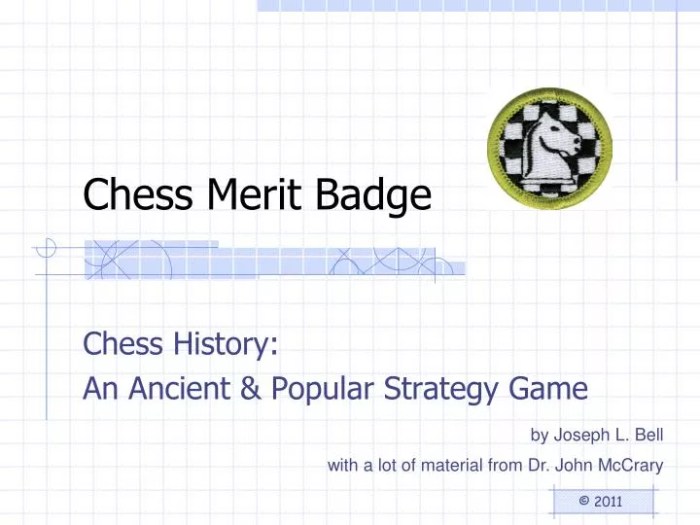
The Chess Merit Badge is a Boy Scouts of America award that recognizes Scouts who have demonstrated proficiency in the game of chess. To earn the badge, Scouts must complete a series of requirements that cover the basics of the game, including how to set up the board, move the pieces, and checkmate the opponent.In
addition to learning the rules of the game, Scouts who earn the Chess Merit Badge also develop critical thinking skills, problem-solving abilities, and sportsmanship. Chess is a challenging game that requires players to think strategically and plan ahead. By playing chess, Scouts can learn how to analyze situations, make decisions, and overcome obstacles.If
you’re interested in earning the Chess Merit Badge, there are a few things you can do to get started. First, find a chess set and learn the basic rules of the game. There are many resources available online and in libraries that can help you learn the basics of chess.
Once you have a basic understanding of the game, you can start practicing by playing against friends or family members.
Tips for Getting Started with Chess
Here are a few tips to help you get started with chess:* Start by learning the basic rules of the game. There are many resources available online and in libraries that can help you learn the basics of chess.
- Practice playing against friends or family members. The best way to improve your chess skills is to practice playing against other people.
- Don’t be afraid to lose. Everyone loses at chess sometimes. The important thing is to learn from your mistakes and keep practicing.
- Have fun! Chess is a challenging but rewarding game. Enjoy the process of learning and improving your skills.
Basic Chess Strategies
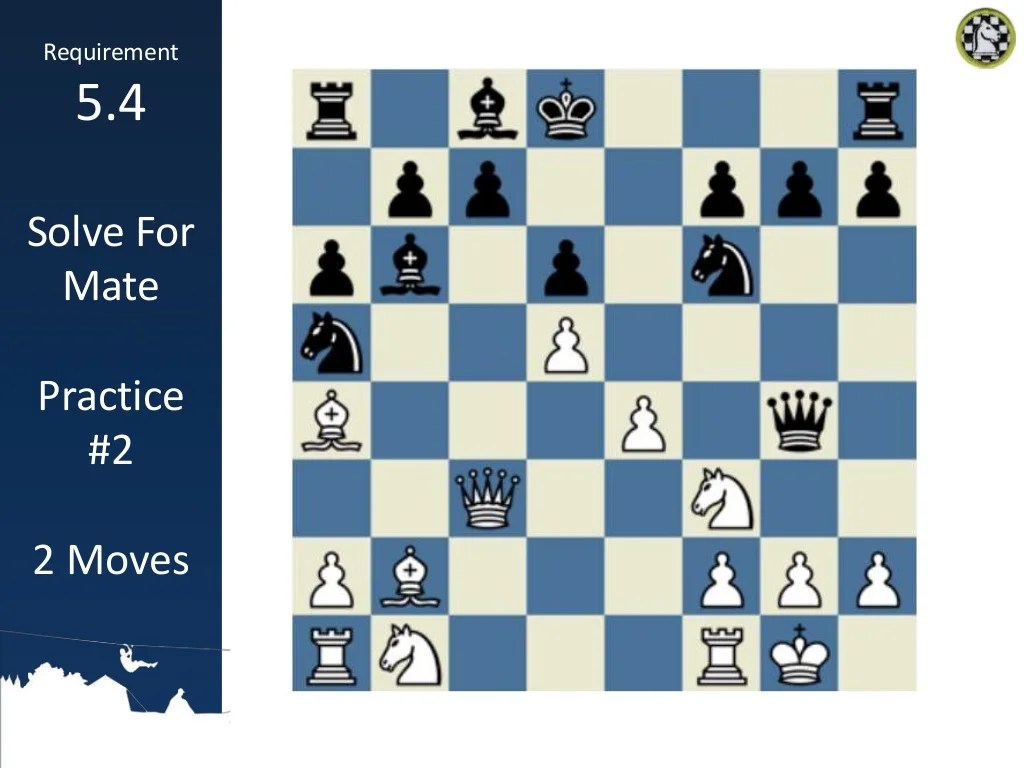
In the realm of chess, strategic acumen reigns supreme. To emerge victorious, players must master the art of controlling the board, developing their pieces, and orchestrating intricate plans. This article delves into the fundamental principles of chess strategy, empowering aspiring players to elevate their gameplay.
Controlling the Center
The center of the chessboard holds immense strategic value. By occupying central squares with pawns or pieces, players can exert control over key lines of attack and limit their opponent’s mobility. Controlling the center allows for greater piece coordination, enhances king safety, and creates opportunities for tactical strikes.
Developing Pieces Early
Developing pieces early in the game is crucial for building a strong position. Knights and bishops should be deployed promptly, followed by rooks and the queen. By activating their pieces, players can gain control of important squares, challenge their opponent’s pieces, and prepare for future attacks.
Intermediate Chess Strategies: Chess Merit Badge Strategies
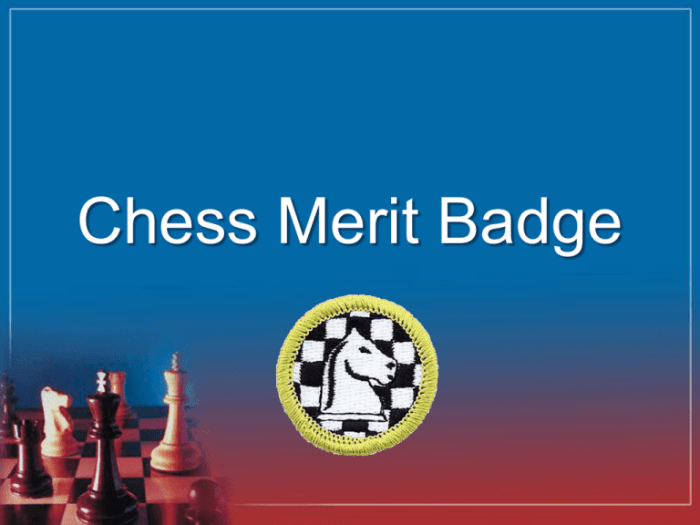
Intermediate chess strategies build upon the foundations of basic chess tactics. They involve a deeper understanding of the game and require players to think strategically and anticipate their opponent’s moves.
Some of the key intermediate chess strategies include analyzing common chess openings, utilizing forks, pins, and skewers, and exploiting weaknesses in the opponent’s position.
Analyzing Common Chess Openings
The opening moves of a chess game can set the tone for the entire match. Intermediate players should familiarize themselves with the most common chess openings, such as the Sicilian Defense, the Ruy Lopez, and the Queen’s Gambit. By understanding the strengths and weaknesses of these openings, players can make informed decisions about how to proceed.
Utilizing Forks, Pins, and Skewers
Forks, pins, and skewers are powerful tactical maneuvers that can put the opponent’s pieces in jeopardy. A fork occurs when a single piece attacks two or more of the opponent’s pieces simultaneously. A pin occurs when a piece is attacked by an opponent’s piece and cannot move without exposing another valuable piece.
A skewer occurs when a piece attacks an opponent’s piece that is protecting a more valuable piece.
Exploiting Weaknesses in the Opponent’s Position, Chess merit badge strategies
Identifying and exploiting weaknesses in the opponent’s position is a crucial skill for intermediate players. Weaknesses can include isolated or unprotected pieces, undeveloped pieces, or weaknesses in the pawn structure. By exploiting these weaknesses, players can gain a significant advantage in the game.
Advanced Chess Strategies
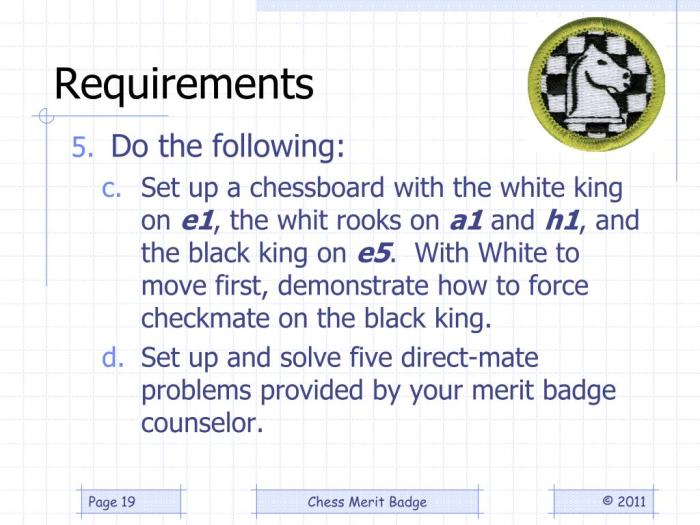
Mastering chess involves not only basic and intermediate strategies but also advanced techniques that enhance gameplay. Advanced chess strategies focus on positional play, endgame technique, and calculating variations and evaluating positions.
Positional Play
Positional play emphasizes controlling key squares, pieces, and space. It involves developing pieces to optimal positions, securing weaknesses in the opponent’s position, and limiting their mobility. By controlling key squares and pieces, players can restrict the opponent’s options and gain an advantage in the long run.
Endgame Technique
Endgame technique becomes crucial when only a few pieces remain on the board. Players must understand how to maneuver their pieces efficiently, create threats, and exploit weaknesses. Endgame skills include knowing how to promote pawns, handle king and pawn endgames, and draw or win specific endgames.
Calculating Variations and Evaluating Positions
Advanced players use calculation and evaluation skills to assess their position and plan their moves. Calculating variations involves considering potential moves and countermoves, while evaluating positions involves assessing the strength and weaknesses of each position based on various factors such as material, piece activity, and pawn structure.
By accurately calculating variations and evaluating positions, players can make informed decisions and increase their chances of success.
Resources for Chess Improvement
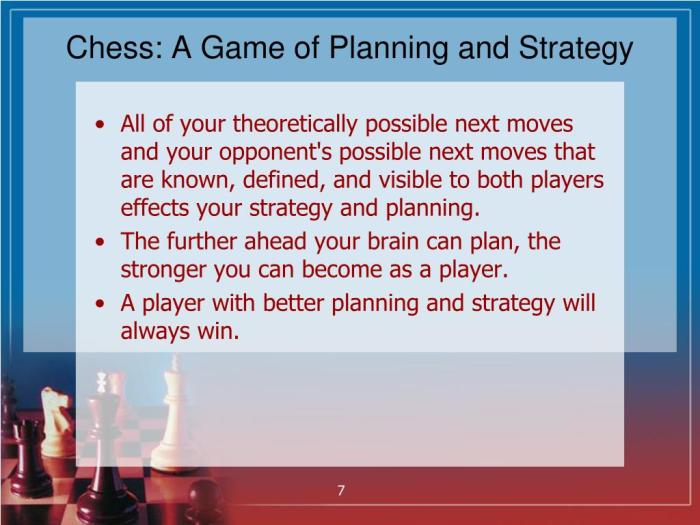
Enhancing your chess skills requires dedication and the utilization of various resources. Online platforms, books, videos, and chess clubs provide ample opportunities for learning and practice.
Online Chess Resources
Numerous websites and apps offer online chess games, tutorials, and analysis tools. Some popular platforms include:
- Chess.com: A comprehensive platform with a vast player base, lessons, and tournaments.
- Lichess.org: An open-source platform known for its user-friendly interface and analysis features.
- Chess24.com: A platform that provides live coverage of tournaments, interactive lessons, and a large database of games.
Books and Videos for Chess Study
Books and videos offer in-depth instruction and analysis of chess principles and strategies. Some recommended resources include:
- My Systemby Aron Nimzowitsch: A classic work on chess strategy and positional play.
- The Art of Attack in Chessby Vladimir Vukovic: A comprehensive guide to attacking techniques.
- Chess Fundamentalsby José Raúl Capablanca: A timeless book on the basics of chess.
Joining a Chess Club
Chess clubs provide a structured environment for learning and practicing chess. They offer:
- Regular tournaments and matches
- Instruction and coaching from experienced players
- Opportunities for social interaction and camaraderie
Closing Notes
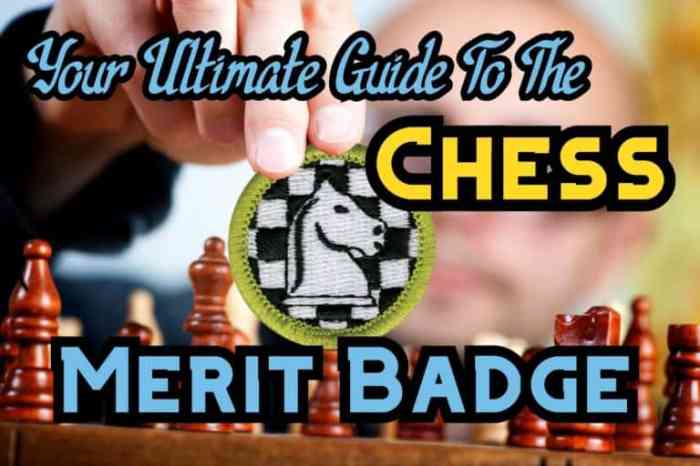
By following the strategies Artikeld in this guide, you’ll not only earn the Chess Merit Badge but also develop a deep understanding of the game, enhancing your critical thinking, problem-solving, and decision-making skills.
So, embark on this chess journey today and discover the rewarding experience that awaits you.
Common Queries
What are the requirements for earning the Chess Merit Badge?
To earn the Chess Merit Badge, you must demonstrate proficiency in various aspects of chess, including knowledge of the rules, basic strategies, and endgame techniques.
What are the benefits of earning the Chess Merit Badge?
Earning the Chess Merit Badge not only recognizes your chess skills but also enhances your cognitive abilities, strategic thinking, and sportsmanship.
How can I get started with chess?
To get started with chess, familiarize yourself with the rules and basic principles. Practice regularly, study chess openings, and seek guidance from experienced players or coaches.
